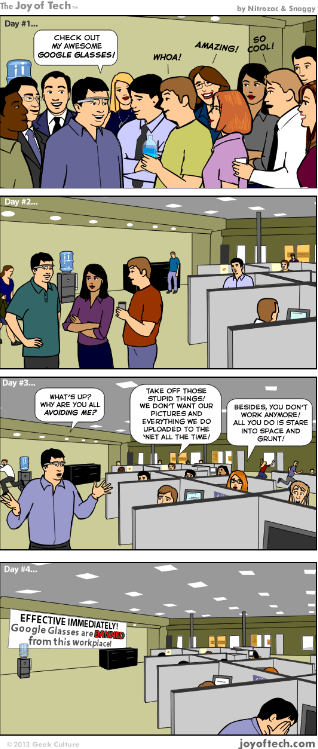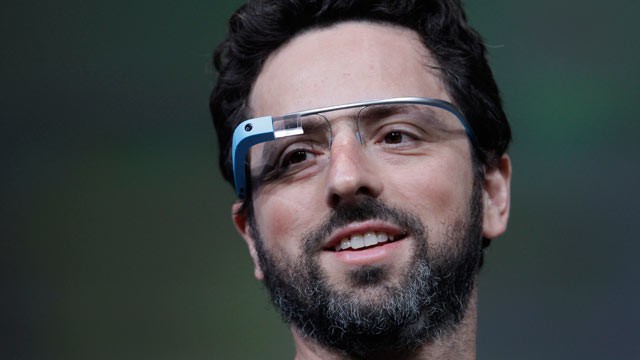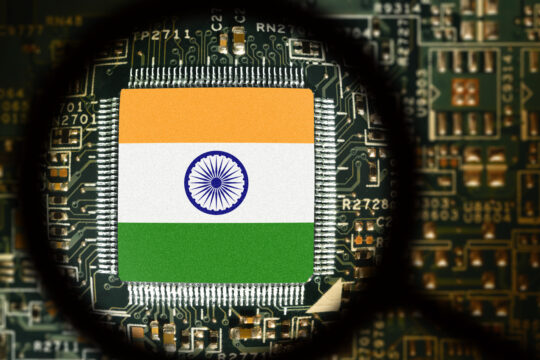 Gone are the “Apple, Samsung, HTC, Sony days”, where boasting about the number of cores or the ppi or the screen size of smartphones will be deemed enough to mark a cellphone manufacturer as a market leader, as we have entered the age of Augmented reality. Google Co-founder & president of Technology, Sergey Brin, has stated that he finds the smart phone emasculating. Well, why will he not do that when Google has unveiled a technology so cool which has been socially accepted? What’s the fun in rubbing a piece of glass is what he claims. While everyone is ogling at the tiny piece of glasses powered with augmented reality, major concerns on privacy are being forgotten. If magnified, these concerns could turn out to be a sudden backlash for the Google glasses, which are far from being designer glasses at this point. Some even claim that these glasses potentially have all the power in the world to create a Cyborg nation – a corporate surveillance state patrolled by people snapping pictures and videos of you without your knowledge.
Gone are the “Apple, Samsung, HTC, Sony days”, where boasting about the number of cores or the ppi or the screen size of smartphones will be deemed enough to mark a cellphone manufacturer as a market leader, as we have entered the age of Augmented reality. Google Co-founder & president of Technology, Sergey Brin, has stated that he finds the smart phone emasculating. Well, why will he not do that when Google has unveiled a technology so cool which has been socially accepted? What’s the fun in rubbing a piece of glass is what he claims. While everyone is ogling at the tiny piece of glasses powered with augmented reality, major concerns on privacy are being forgotten. If magnified, these concerns could turn out to be a sudden backlash for the Google glasses, which are far from being designer glasses at this point. Some even claim that these glasses potentially have all the power in the world to create a Cyborg nation – a corporate surveillance state patrolled by people snapping pictures and videos of you without your knowledge.
Throwing more light on these criticisms, let’s try to clearly understand what these glasses are capable of.
– Widespread availability of Google glasses or a similar element for that matter would create a future where “privacy is impossible”.
– And anyone can walk around like a “creepy cameraman”, recording videos of you, capturing snaps of you and even scarier, collecting information about you that you can hardly imagine and absolutely without your knowledge. Your social security number, your credit score, your home address and even your relationship status, would be known to external world without your knowledge. I.e. Anyone could walk around with augmented reality screens in front of their eyes about anything under the sky they are interested in and which Google is aware of.
Well, it’s the nerd’s dreams coming true right? Ideas like this in future would bring some absurd things into reality. We will have clothes blush instead of us, we will have machines telling us what to do and how to feel. We will also lose our ability to analyze the world, to feel it, to discover it the way it is, touch it, and see how it reacts to us, just because some Google service will be streaming all that information directly in our heads…
In short, once Google knows something about you, the rest of the world will know it too. Sure, we may one day talk about “Google” controlling our lives, not too far those days are. There would be no distinction between the digital world and the real world. In real world, people would get along and interact with others, based on the information available to them from these glasses about others. Simply put,
Project Google glass = Privacy nightmare
But is that really the case? As Jon Evans of TechCrunch argued recently in a piece called “Who’s Afraid of Google Glass?”, these Google Glasses may actually lead to the reverse situation – your loss of privacy may empower you in ways never before possible. The example he uses is a case in which police officers would refrain from instances of police brutality if they knew that anyone could be recording them at any time. And this example could be extended in a number of different ways – if you’re walking the streets of New York City, you wouldn’t have to worry about a random stop-and-frisk because the police officers would already know that you’re not a criminal. If you’re at the airport, you wouldn’t have to worry about a full pat-down in the security line because TSA would know that you’re not a terrorist.
Also, on the contrary, Daniel Shapero-VP, Talent solutions & Insights, San Francisco states Google glasses could potentially lead to the development of features like “Happiness graph”, analogous to Mark Zuckerbeg’s Social graph which could possibly predict your happiness score by analyzing the your pupils with a second camera faced inwards, as studies reveal that our pupils dilate when a person is happy or excited or aroused by we see.(For more information- http://www.linkedin.com/today/post/article/20130319232124-314058-dating-google-glass-the-happiness-graph)
While Google glass complainers are concerned about the loss of privacy, Eric Schmidt, CEO of Google has abundantly made it clear, “if you’re doing something that you don’t want anyone to know, maybe you shouldn’t be doing it in the first place”. Google glasses won’t create a nightmarish scenario for everyone’s information, but it will subtly change the relationship we with the world around us, is what Google claims.
Image credit: http://tapastic.com/episode/2058












